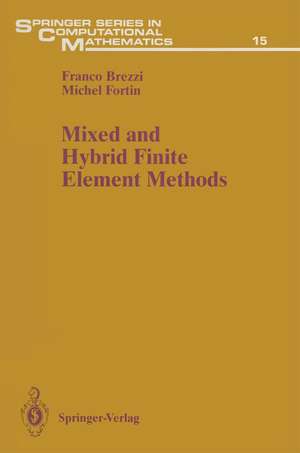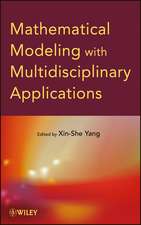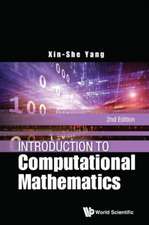Mixed and Hybrid Finite Element Methods: Springer Series in Computational Mathematics, cartea 15
Autor Franco Brezzi, Michel Fortinen Limba Engleză Paperback – 17 sep 2011
Din seria Springer Series in Computational Mathematics
- 24%
 Preț: 703.01 lei
Preț: 703.01 lei - 15%
 Preț: 497.64 lei
Preț: 497.64 lei - 18%
 Preț: 726.85 lei
Preț: 726.85 lei -
 Preț: 403.91 lei
Preț: 403.91 lei -
 Preț: 386.61 lei
Preț: 386.61 lei - 18%
 Preț: 1399.11 lei
Preț: 1399.11 lei -
 Preț: 394.51 lei
Preț: 394.51 lei - 18%
 Preț: 1395.94 lei
Preț: 1395.94 lei - 20%
 Preț: 996.22 lei
Preț: 996.22 lei - 24%
 Preț: 635.75 lei
Preț: 635.75 lei - 15%
 Preț: 649.22 lei
Preț: 649.22 lei -
 Preț: 400.47 lei
Preț: 400.47 lei - 18%
 Preț: 740.44 lei
Preț: 740.44 lei - 15%
 Preț: 643.65 lei
Preț: 643.65 lei -
 Preț: 380.63 lei
Preț: 380.63 lei - 18%
 Preț: 904.74 lei
Preț: 904.74 lei - 18%
 Preț: 1014.28 lei
Preț: 1014.28 lei - 18%
 Preț: 1111.97 lei
Preț: 1111.97 lei -
 Preț: 393.90 lei
Preț: 393.90 lei - 18%
 Preț: 947.98 lei
Preț: 947.98 lei - 15%
 Preț: 650.04 lei
Preț: 650.04 lei - 15%
 Preț: 658.05 lei
Preț: 658.05 lei - 15%
 Preț: 521.60 lei
Preț: 521.60 lei - 15%
 Preț: 660.04 lei
Preț: 660.04 lei - 18%
 Preț: 1397.52 lei
Preț: 1397.52 lei - 18%
 Preț: 1126.35 lei
Preț: 1126.35 lei - 18%
 Preț: 1117.48 lei
Preț: 1117.48 lei - 18%
 Preț: 793.76 lei
Preț: 793.76 lei - 15%
 Preț: 710.23 lei
Preț: 710.23 lei
Preț: 784.48 lei
Preț vechi: 956.68 lei
-18% Nou
Puncte Express: 1177
Preț estimativ în valută:
150.13€ • 163.02$ • 126.11£
150.13€ • 163.02$ • 126.11£
Carte tipărită la comandă
Livrare economică 22 aprilie-06 mai
Preluare comenzi: 021 569.72.76
Specificații
ISBN-13: 9781461278245
ISBN-10: 1461278244
Pagini: 368
Ilustrații: IX, 350 p.
Dimensiuni: 155 x 235 x 19 mm
Greutate: 0.51 kg
Ediția:Softcover reprint of the original 1st ed. 1991
Editura: Springer
Colecția Springer
Seria Springer Series in Computational Mathematics
Locul publicării:New York, NY, United States
ISBN-10: 1461278244
Pagini: 368
Ilustrații: IX, 350 p.
Dimensiuni: 155 x 235 x 19 mm
Greutate: 0.51 kg
Ediția:Softcover reprint of the original 1st ed. 1991
Editura: Springer
Colecția Springer
Seria Springer Series in Computational Mathematics
Locul publicării:New York, NY, United States
Public țintă
ResearchCuprins
I: Variational Formulations and Finite Element Methods.- §1. Classical Methods.- §2. Model Problems and Elementary Properties of Some Functional Spaces.- §3. Duality Methods.- §4. Domain Decomposition Methods, Hybrid Methods.- §5. Augmented Variational Formulations.- §6. Transposition Methods.- §7. Bibliographical remarks.- II: Approximation of Saddle Point Problems.- §1. Existence and Uniqueness of Solutions.- §2. Approximation of the Problem.- §3. Numerical Properties of the Discrete Problem.- §4. Solution by Penalty Methods, Convergence of Regularized Problems.- §5. Iterative Solution Methods. Uzawa’s Algorithm.- §6. Concluding Remarks.- III: Function Spaces and Finite Element Approximations.- §1. Properties of the spaces Hs(?) and H(div; ?).- §2. Finite Element Approximations of H1(?) and H2(?).- §3. Approximations of H (div; ?).- §4. Concluding Remarks.- IV: Various Examples.- §1. Nonstandard Methods for Dirichlet’s Problem.- §2. Stokes Problem.- §3. Elasticity Problems.- §4. A Mixed Fourth-Order Problem.- §5. Dual Hybrid Methods for Plate Bending Problems.- V: Complements on Mixed Methods for Elliptic Problems.- §1. Numerical Solutions.- §2. A Brief Analysis of the Computational Effort.- §3. Error Analysis for the Multiplier.- §4. Error Estimates in Other Norms.- §5. Application to an Equation Arising from Semiconductor Theory.- §6. How Things Can Go Wrong.- §7. Augmented Formulations.- VI: Incompressible Materials and Flow Problems.- §1. Introduction.- §2. The Stokes Problem as a Mixed Problem.- §3. Examples of Elements for Incompressible Materials.- §4. Standard Techniques of Proof for the inf-sup Condition.- §5. Macroelement Techniques and Spurious Pressure Modes.- §6. An Alternative Technique of Proof and Generalized Taylor-Hood Element.- §7. Nearly Incompressible Elasticity, Reduced Integration Methods and Relation with Penalty Methods.- §8. Divergence-Free Basis, Discrete Stream Functions.- §9. Other Mixed and Hybrid Methods for Incompressible Flows.- VII: Other Applications.- §1. Mixed Methods for Linear Thin Plates.- §2. Mixed Methods for Linear Elasticity Problems.- §3. Moderately Thick Plates.- References.














